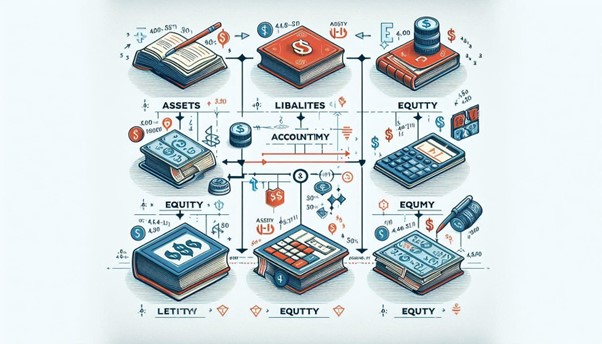Introduction
Accounting systems form the foundation of financial management for businesses. Double-entry and triple-entry accounting are two of the most important methods used today. This blog will delve into the principles, advantages, and distinctions of these systems, offering a comprehensive understanding of how they function and their importance.
What is Double-Entry Accounting?
Double-entry accounting is a method where every financial transaction affects at least two accounts, ensuring the accounting equation (Assets = Liabilities + Equity) remains balanced. This approach, introduced in the 15th century by Luca Pacioli, provided a systematic way to record financial transactions, significantly improving the accuracy and reliability of financial data.
What is Triple-Entry Accounting?
Triple-entry accounting builds upon the double-entry system by incorporating a third entry, usually recorded on a blockchain. This additional entry acts as a verification mechanism, enhancing transparency and security. Triple-entry accounting is an emerging concept that aims to address the limitations of traditional systems by leveraging advanced technology.
Double-Entry Accounting

Understanding Double Entry And Triple Entry Accounting
1. The Basic Principles of Double-Entry Accounting
Double-entry accounting ensures that every transaction impacts at least two accounts, keeping the accounting equation balanced. This principle offers a complete picture of a company’s financial status.
2. The Accounting Equation
The accounting equation is fundamental to double-entry accounting: Assets=Liabilities+Equity\text{Assets} = \text{Liabilities} + \text{Equity} Assets=Liabilities+Equity This equation must always be balanced, ensuring accurate financial records.
3. The Journal and Ledger
Transactions are initially recorded in the journal (book of original entry) and then posted to the ledger, which organizes them into specific accounts. This process helps in the systematic recording and easy retrieval of financial data.
4. The Trial Balance
A trial balance is prepared to ensure that total debits equal total credits. It serves as an initial check before the tax preparation of financial statements, highlighting any discrepancies that need correction.
5. The Financial Statements
Double-entry accounting generates key financial statements such as the balance sheet, income statement, and cash flow statement, providing a comprehensive view of the company’s financial performance and position.
How the Double-Entry System Works
In double-entry accounting, each transaction is recorded with corresponding debits and credits.
- Debits: Increase assets and expenses or decrease liabilities, equity, and income.
- Credits: Increase liabilities, equity, and income or decrease assets and expenses.
For example, when a company makes a sale on credit, it debits accounts receivable and credits sales revenue, maintaining the balance of the accounting equation.
Triple-Entry Accounting

Understanding Double Entry And Triple Entry Accounting
1. The Basic Principles of Triple-Entry Accounting
Triple-entry accounting enhances the double-entry system by adding a third entry, typically recorded on a blockchain. This entry serves as a cryptographic receipt, providing an immutable record of transactions.
2. The Accounting Equation
Triple-entry accounting maintains the balance of the accounting equation with an added layer of security and verification through blockchain technology.
3. The Journal and Ledger
Blockchain records are a supplement to the journal and ledger in triple-entry accounting, ensuring that transactions are verifiable and tamper-proof.
4. The Trial Balance
The trial balance in triple-entry accounting ensures that debits equal credits, with the additional benefit of blockchain verification to confirm the accuracy and integrity of the entries.
5. The Financial Statements
Due to the immutable blockchain records backing them, financial statements produced using triple-entry accounting offer increased transparency and security.
How the Triple-Entry System Works
Triple-entry accounting introduces a third entry recorded on a blockchain, adding an extra layer of verification. This system uses blockchain technology to create a decentralized ledger that is accessible to all parties involved in a transaction.
For instance, when a company records a sale, the transaction is documented in the traditional journal and ledger and simultaneously on a blockchain. This third entry acts as a cryptographic receipt, ensuring the transaction is transparent and immutable.
Benefits of Using Double-Entry Accounting
1. Accuracy and Reliability
- Error Detection: The dual recording system acts as a built-in check. Any discrepancies between debits and credits indicate a potential error, prompting immediate investigation.
- Data Integrity: By requiring two entries for each transaction, the system ensures that all financial data is accounted for, reducing the risk of omissions or inaccuracies.
2. Comprehensive Financial Overview
- Real-Time Insights: Double-entry accounting provides a dynamic view of a business’s financial health. Changes are reflected immediately, allowing for timely decision-making.
- Detailed Record-Keeping: Every transaction is recorded, creating a detailed history that can be used for analysis, auditing, and tax preparation.
3. Improved Decision Making
- Informed Choices: Accurate and up-to-date financial information empowers businesses to make informed decisions regarding investments, expenses, and revenue generation.
- Performance Evaluation: By tracking income, expenses, and profitability, businesses can assess their performance and identify areas for improvement.
4. Fraud Prevention
- Enhanced Accountability: The double-entry system requires multiple individuals to handle different aspects of accounting, reducing the risk of fraudulent activities.
- Detection of Irregularities: Any inconsistencies in the accounting records can be red flags for potential fraud.
5. Compliance and Auditing
- Regulatory Adherence: Double-entry accounting provides a solid foundation for complying with financial regulations and tax requirements.
- Audit Readiness: Detailed financial records facilitate smooth audits and reduce the likelihood of audit findings.
Benefits of Triple-Entry Accounting
1. Enhanced Security:
By utilizing blockchain technology, triple-entry accounting creates an immutable and tamper-proof record of financial transactions, significantly reducing the risk of fraud and data breaches.
2. Increased Transparency:
The decentralized nature of triple-entry accounting allows for greater transparency, as all parties involved in a transaction can access and verify the information.
3. Improved Efficiency:
Automation and real-time updates enabled by blockchain technology streamline accounting processes, reducing manual efforts and errors.
4. Real-Time Financial Insights:
Triple-entry accounting provides up-to-date financial information, enabling businesses to make data-driven decisions promptly.
5. Strengthened audit trails:
The detailed and immutable record of transactions created by triple-entry accounting simplifies the audit process, reducing costs and time.
The Differences Between Double-Entry and Triple-Entry Accounting

Understanding Double Entry And Triple Entry Accounting
1. The Number of Entries
- Double-Entry Accounting: This involves two entries (debits and credits) for each transaction.
- Triple-Entry Accounting: Adds a third entry on a blockchain, enhancing verification and security.
2. The Use of Blockchain Technology
- Double-Entry Accounting: Relies on traditional journals and ledgers.
- Triple-Entry Accounting: Incorporates blockchain technology for additional verification and security.
3. The Level of Transparency
- Double-Entry Accounting: Provides transparency through traditional financial statements.
- Triple-Entry Accounting: Offers enhanced transparency with immutable blockchain records.
4. The Cost of Implementation
- Double-entry accounting is generally more cost-effective and easier to implement.
- Triple-Entry Accounting: May involve higher initial costs due to the integration of blockchain technology but can offer long-term benefits in security and transparency.
Conclusion
Double-entry accounting remains a fundamental method for financial record-keeping, offering accuracy and comprehensive financial tracking. Triple-entry accounting, with its enhanced transparency and security through blockchain technology, represents an innovative advancement in the field. Businesses should carefully assess their needs and resources to determine the most suitable accounting system. Staying informed about these developments is crucial for maintaining financial integrity and leveraging the benefits of modern accounting practices.
Contact BusAcTa Advisors today to schedule a free consultation and discover how our outsourced tax preparation services can help you run your business more efficiently and provide better client service.





